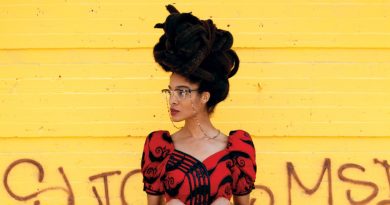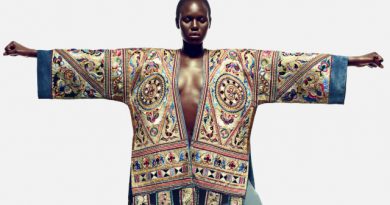Ruth Dayan, Peace Activist and Maskit Fashion Founder Dies at 103 – WWD
Ruth Dayan, founder of the Maskit fashion house and the first wife of the late former Israeli defense minister Moshe Dayan, has died at the age of 103.
She died Feb. 5 at her home in Tel Aviv after an illness, according to Nir Tal, chief executive officer of Maskit.
A daughter of Russian immigrants who was born in 1917 under Turkish rule, Dayan experienced the British conquest, the proclamation of the state of Israel, numerous wars and efforts to resolve the Palestinian conflict. With Maskit, she created Israel’s first fashion house and in doing so helped bridge cultural, political and religious divides. Fluent in multiple languages, Dayan was an advocate of promoting understanding across cultures. “Politics is one thing. Art and understanding other cultures in another,” Dayan told WWD in 1974.
Dayan, who used to weave, started in handcrafts in 1949 and founded Maskit in 1954. The government-sponsored organization was initially created to preserve the local craftsmanship of all new immigrants who came to Israel and to provide them work. Maskit produced a wide range of lifestyle products including carpets, jewelry, home decor and gifts, among other items. Her intention was to bring people together via fashion, culture and with a strong sense of aesthetics.
Maskit executives plan to organize a secular exhibition about the company being the first social entrepreneurship in Israel, and perhaps worldwide — to relay its messages of sustainable fashion, values and other relevant topics.
With the help of Hungarian designer Fini Leitersdorf, who designed Maskit fashion and accessories for 15 years, Dayan created styles that were embellished with embroidery and other accents done by immigrants and Bedouin, Druze, Palestinian, Lebanese and Syrian women. After the Six-Day War of 1967, Arab workers were included in Maskit’s workforce. Dayan once described the Maskit name as signifying an “ornament” or “an aesthetically exciting object.” In July 1967, 1,500 people turned up to greet Dayan and support Maskit at an event at the America-Israel Culture House in New York. Dayan once said of her efforts, “It does as much for their dignity as it does for their livelihoods.”
Along with good taste and an intercontinental sensibility, Dayan had an entrepreneurial mind-set. She “was very much a worldwide citizen. She traveled all over the world, meeting very important people as the first wife of Moshe Dayan. She explored the world before most of us did — in the ’50s and ’60s,” Tal said.
He continued, “She was very active for people. She believed that when you meet someone, you [should] forget the gender, the nationality and all the things that come with the history and just believe people and not all the other sorts of distractions. Ruth was very much about peace and for the future of peace, by investing in kids and education.”
At its peak Maskit employed 2,000 people and had 10 stores in Israel and one on Fifth Avenue in New York. The company sold to Bergdorf Goodman, Neiman Marcus and Saks Fifth Avenue. There were also joint shows with Givenchy and Yves Saint Laurent. The Israeli government owned Maskit until 1978, when it became privately owned. The company was shut down in 1994, but it was revived in 2014 with Dayan serving as the honorary chairman. Head designer Sharon Tal, who had interned for Alber Elbaz and later specialized in embroidery at Alexander McQueen, was brought in to handle the creative side.
Trunk shows were held in various cities before the coronavirus crisis and a direct-to-consumer online approach still exists for the fashion collection and non-apparel items. Currently, Maskit has about 30 employees and operates an in-house atelier and three stores in Israel. The brand is known for its “Desert” coat, which has been worn by celebrities like Sarah Jessica Parker and former First Lady Michelle Obama, who received one as a diplomatic gift.
Born in Haifa, Israel, she spent some of her childhood years in England before the family returned to Israel. She lived in the agricultural community of Nahalal for many years. There she met and later wed Dayan in 1935. They had three children — Yael, an author-turned-politician, and the late Ehud, a sculptor, and Assi, a renowned actor and filmmaker, who died in 2017 and 2014, respectively. Dayan and her husband divorced after 37 years of marriage.
An early proponent of women’s empowerment and social justice entrepreneurship, Dayan was visionary in that she believed in enlisting top-notch designers and artists to build Maskit from scratch. Aware that many immigrants from North Africa were adept silversmiths, embroiders, sculptors and artisans, she encouraged them to put those skills to use in order to provide for their families.
Tal said, “Everything was inspired by the geography, culture and the history of Israel. Now we are very much influenced by retail and Tel Aviv also. Ruth was an active part of the company until a few weeks ago. First she was our muse and inspiration. She got weekly updates about the company and what was new.”
Dayan introduced Maskit handwoven dresses and other fashion items to the U.S. in 1967. With the help of Seventh Avenue’s Jerry Silverman, Dayan hosted a fashion event in New York. After greeting attendees with “the biggest smile and like she’d known them all her life,” the blue-eyed Dayan spoke with WWD about her 12-hour days working and traveling. As for life with her high-powered husband, Dayan told WWD in 1967, “We each have our jobs and they don’t clash.”
”I’m a very unreligious person. I’m sure religion has been the cause of a lot of good in this world, but the interpretation of it has certainly done a lot of bad. I believe in human beings and what they can do for each other…I think there is someone or something unknown to all of us but I think it is the same for everyone,” she told WWD that year.
Dayan also wrote several books including “Crafts of Israel” and “Or Did I Dream the Dream? The True Story of Ruth Dayan,” which detailed her husband’s numerous extramarital affairs and famously stated that he “had such bad taste in women.” Despite that openness in her writing and the ability to cross political and religious boundaries, Dayan was modest and would not allow the Maskit team to feature large pictures of her in the Maskit museum in Tel Aviv. From her perspective, “She never did anything extreme. I just did my work.”
”My interests in the crafts were purely human. I never did it to have anything to do with religion,” Dayan told WWD in 1974. “No one feels that our work is something frivolous. For Israel, the crafts are part of our economy. We don’t have natural resources.”
Having lived through war-torn periods, Dayan’s work in fashion at times provided enlightenment to others. She said that she sometimes had to explain delayed shipments to American buyers such as “the artist is fighting in a war and won’t be back for several months.” A human rights supporter, Dayan was dedicated to seeing the peace process evolve.
”I head an organization for understanding Arabs and Jews. I feel most strongly that Jews should learn to speak Arabic as well as Hebrew. Most Arabs speak Hebrew,” Dayan said in 1974.
Linked as she was to her first husband, Dayan was unabashed about discussing their separation. “I’m proud I was Moshe’s wife for 37 years. I’m also proud I had the guts to leave him. I really don’t think I would marry anyone. We had a very special kind of life full of its ups and downs and full of history but I think friends are more important than marriage,” she told WWD in 1974.
”Divorce shouldn’t be such a calamity either. It’s part of life, like abortion. Did I ever have an abortion? You shouldn’t ask questions like that,” Dayan said.
In 2006, Dayan helped to connect New York-based designer Nili Lotan with a group of Bedouin craftswomen in southern Israel to incorporate their embroidery to her collection.
Her humanitarian efforts included serving on the board for B’Tselem. In 2014, she was awarded the President’s Medal by the late Shimon Peres. Dayan is survived by her daughter Yael and sister Reuma.





